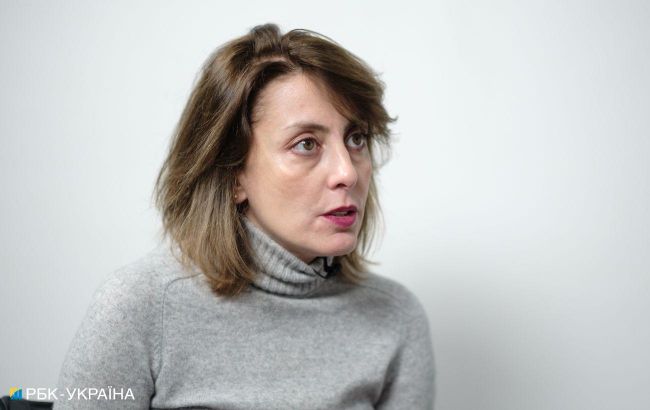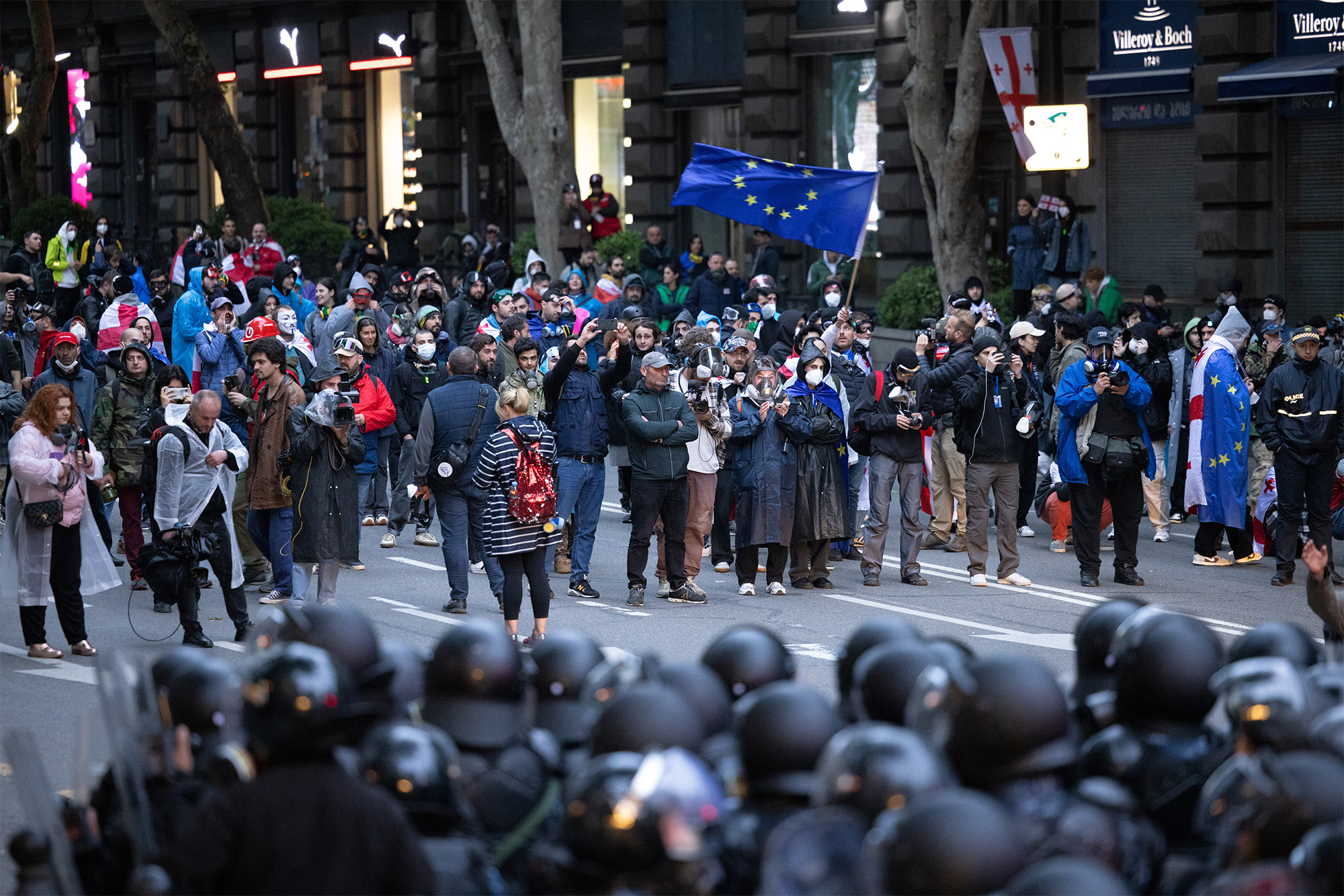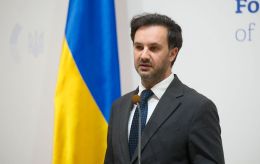Khatia Dekanoidze: We cannot allow Georgia to return to Russian orbit again
 Khatia Dekanoidze (Photo: Vitalii Nosach / RBC-Ukraine)
Khatia Dekanoidze (Photo: Vitalii Nosach / RBC-Ukraine)
In a blitz interview with RBC-Ukraine, opposition member of the Georgian Parliament and former head of the National Police of Ukraine, Khatia Dekanoidze, discussed the demands of protesters in Georgia, whether changes in government can be expected through revolutionary means, and how the EU and the USA should react.
For a month now, mass street protests have been ongoing in Georgia, linked to the government's attempts to pass a bill on transparency of foreign influence. Its essence coincides with similar Russian legislation on foreign agents, which has proven to be an effective method in Russia for combating any dissent.
Georgian opposition and protesters, primarily driven by youth, believe that Tbilisi is on the path to follow Moscow's lead, suppressing civil society and non-governmental organizations, particularly significant in light of the upcoming parliamentary elections planned for October. In a broader context, the government's actions are seen as an attempt to bring Georgia back into the orbit of Russian influence and derail the country's European integration. The foreign agents bill has been harshly criticized by the European Union and the United States, but the matter has not yet reached concrete measures.
In the current Georgian protests, Ukrainians may see many parallels with the events of the Revolution of Dignity: the violent dispersal of peaceful actions, the use of titushkas (paid thug), and even their own anti-Maidan – a government rally in support of the controversial law. Among the speakers at this rally was oligarch, former prime minister, founder, and honorary chairman of the ruling party Georgian Dream, Bidzina Ivanishvili, whom the opposition considers the real ruler of Georgia.
In a conversation with RBC-Ukraine, opposition member Khatia Dekanoidze emphasizes that the protesters would prefer to avoid harsh scenarios but insists that the protests must continue.
- Tomorrow, the final adoption of the foreign agents bill is scheduled to take place. What might happen next and what are the protesters' demands? Is it just about this law, or, as in Ukraine during the Revolution of Dignity, have the protesters already moved on to demanding the resignation of the government itself?
- Tomorrow the third reading will take place, and after that, the president will veto the bill. And then the procedure for overcoming the veto will follow, I think it will be in early June. That's the legal procedure.
The protests continue. Among the demands: "no to the Russian law!" and "no to the Russian government!" or "no to the Russian regime!" This is important.
But most importantly, for you to understand, the government here in Georgia doesn't decide anything; Ivanishvili decides everything, his protégés. And most importantly, we need to reach elections, democratic elections without this law. Because if they adopt this law, it means Ivanishvili wants to eliminate all civil society, all NGOs.
The same people who took to the streets and say "no to the Russian law!" consider "no to the Russian regime!"
I think the protests will continue, they are growing. Today, all institutes and universities have joined the protest, students have come out in Batumi, Kutaisi, and other cities. And this is very important news because students have never come out so massively before.
- Do you not consider a change of power through revolutionary means, as was the case in Ukraine in 2014, or through early elections, to be possible?
- Early elections are already impossible because there are only 6 months left until the regular elections.
Even if they push through legislation, it would be very weak because it relies solely on the police and administrative resources. So, I think the protests should continue. This is very important. And I don't think Ivanishvili will be able to get out of this situation, he won't be able to.
- In February 2014, increasingly harsh actions by the police in Ukraine led to an outbreak of protests and a change of power outside of any elections, through direct action. Do you see such a scenario as probable?
- We will strive to prevent such a harsh scenario. All the people in Georgia are very concerned. But most importantly, it must be understood that we have no other choice but to protest and demonstrate. We cannot allow Georgia to return to the Russian orbit. And we cannot allow ourselves to lose the country. Both our generation and the new generation.
Ivanishvili is not de-escalating, the government is not doing so. Our protests are peaceful. Therefore, all responsibility lies with the government.
- How do you assess the reaction from the European Union, and what actions would you like to see from the EU right now? How should they assist you?
- I believe the most important thing is to impose sanctions against the 83 majority deputies, Ivanishvili, and those individuals who are against the constitution of Georgia. That's the first step. Secondly, they should openly state that with the Georgian Dream, with Ivanishvili, Georgia will not enter the European Union. There are also talks about suspending visa-free travel and revoking candidate status in the EU.
The United States should also impose sanctions because many relatives and children of those deputies who vote for the Russian law are studying in the States and Europe.
- Georgia is economically dependent on Russia, which buys many key Georgian products, and thus this gives Russians a mechanism of influence, which historically Russia has been fond of using by imposing embargoes on various Georgian goods. Is there an alternative mechanism in terms of effectiveness to influence the situation in the European Union? You mentioned political measures, but can something be done in the economic sphere?
- I believe that political measures are crucial. Imposing sanctions such as entry bans for deputies (who vote for the foreign agents law - ed.) is essential. They shouldn't be able to freely travel around Europe and the United States. I think this will be enough for the Georgian people to understand that there are measures from the European Union, tough measures, because until now, there have only been statements.

Protests in Tbilisi (photo: Getty Images)
- The events of recent weeks, when mass protests began against the bill, have somehow influenced the core electorate of the Georgian Dream. Have they changed the electoral picture?
- Of course. I think those who were still unsure whether Ivanishvili was pro-Russian now understand very clearly that he is pro-Russian.
- Is there any noticeable Russian trace in the current events?
- I am convinced that Ivanishvili's strategic advisors are Russians. I am absolutely certain of that. As for infiltration, it's unclear at the moment. But I am confident that infiltration is significant, of course, in the form of intelligence services that have infiltrated Georgia
- The protest is generally quite horizontal, there isn't any single leader, especially among the politicians, is that correct?
- No, there isn't. It's a very horizontal protest. That's good because propaganda can easily discredit one or two leaders. So it's very important that young people, activists, and students take the main stage; it's important to keep the protest in this form.

